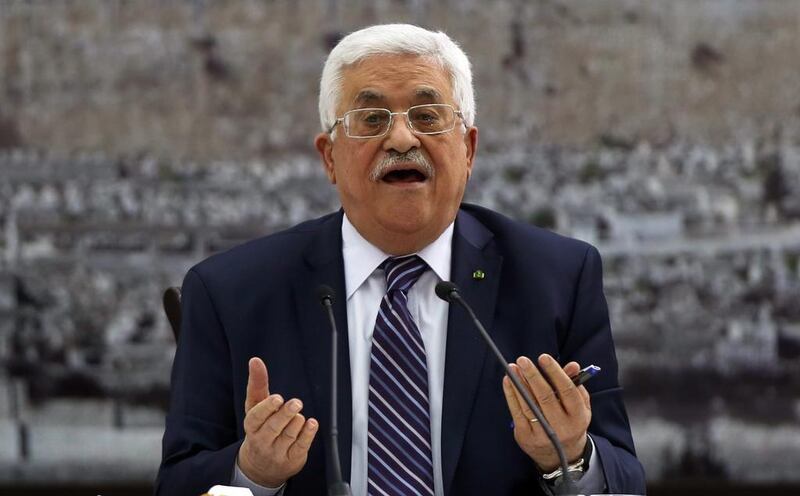RAMALLAH // The US secretary of state John Kerry last night cancelled a return to the Middle East to try to rescue peace talks after both Palestinians and Israelis made his job more difficult.
Mahmoud Abbas signed applications for the Palestinians to join 15 United Nations agencies, and Israel reissued tenders for 708 settler homes in occupied East Jerusalem.
The International Criminal Court and International Court of Justice are not among the bodies Palestine has applied to join, but they do include the Geneva and Vienna Conventions. The applications will be suspended for nine months.
“This is not a move against America, or any other party – it is our right,” said Mr Abbas, president of the Palestinian Authority.
The Palestinians had agreed not to seek membership of international bodies or pursue legal action against Israel during the nine months of talks that Mr Kerry launched in July. In return, Israel agreed to release 104 Palestinian prisoners.
Israel has refused to release the final batch of 26 prisoners, and used them as a bargaining chip to extend talks beyond their April 29 deadline.
Palestinians want East Jerusalem as their capital, and a senior Palestinian official said the new Israeli settlement homes were an attempt to derail the peace talks.
Hanan Ashrawi, a senior member of the Palestine Liberation Organisation, said the Israeli announcement was an “in-your-face statement and an active response to Kerry’s peacemaking attempts that says that this Israeli government is more committed to settlements than a viable peace with the Palestinians”.
Mr Kerry flew from Paris to Tel Aviv on Monday night and twice met Israel’s prime minister, Benjamin Netanyahu. He also met the chief negotiator for the Palestinians, Saeb Erekat, early yesterday before returning to Europe for a Nato conference.
He was expected to arrive in Ramallah today for talks with Mr Abbas, but the trip was cancelled last night. The State Department said they remained “in close touch with the team on the ground”.
Faced with a possible collapse of the peace talks, Mr Kerry has discussed with Israel the release of Jonathan Pollard, a US citizen who was convicted of spying on America for the Israelis, as an incentive to continue the negotiations.
Pollard, a US navy analyst, was arrested in 1985 for passing sensitive documents to Israel about US espionage in the Middle East. He was sentenced to life in prison. Israel later granted him citizenship, and has unsuccessfully lobbied for his release.
His wife, Esther, told Israel’s Jerusalem Post newspaper that he was seriously ill and had undergone surgery for “multiple serious complications in his digestive system”.
Mr Kerry, who had hoped to broker a comprehensive peace deal by this month, sought to lower expectations this year by trying to broker a “framework” deal as a stepping-stone to resolving the major final-status issues. Those include how to divide Jerusalem, Palestinian refugees, borders and security.
hnaylor@thenational.ae
* Additional reporting by Agence France-Presse





